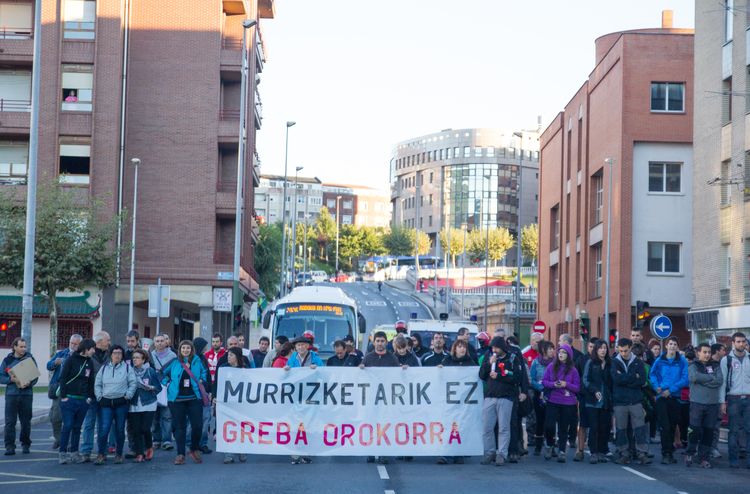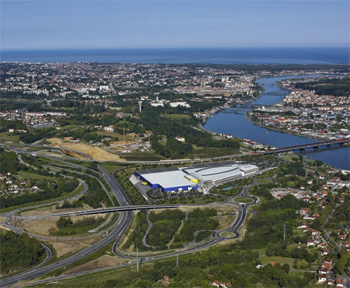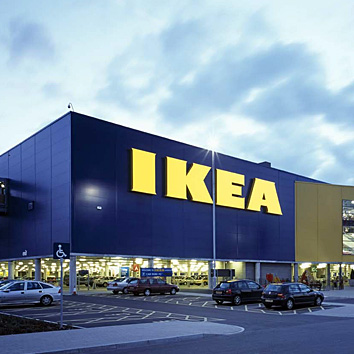Barakaldo to Baiona selling low cost life
- After Barakaldo's, IKEA's second franchise will open its doors in Baiona, where it will be installed from today. There are eleven years of difference between the “independent republics” of Barakaldo and Baiona, but, in addition to the cheap furniture, there is a thread linking the two projects of the Swedish multinational: the precarious life. The low cost model has encouraged us.
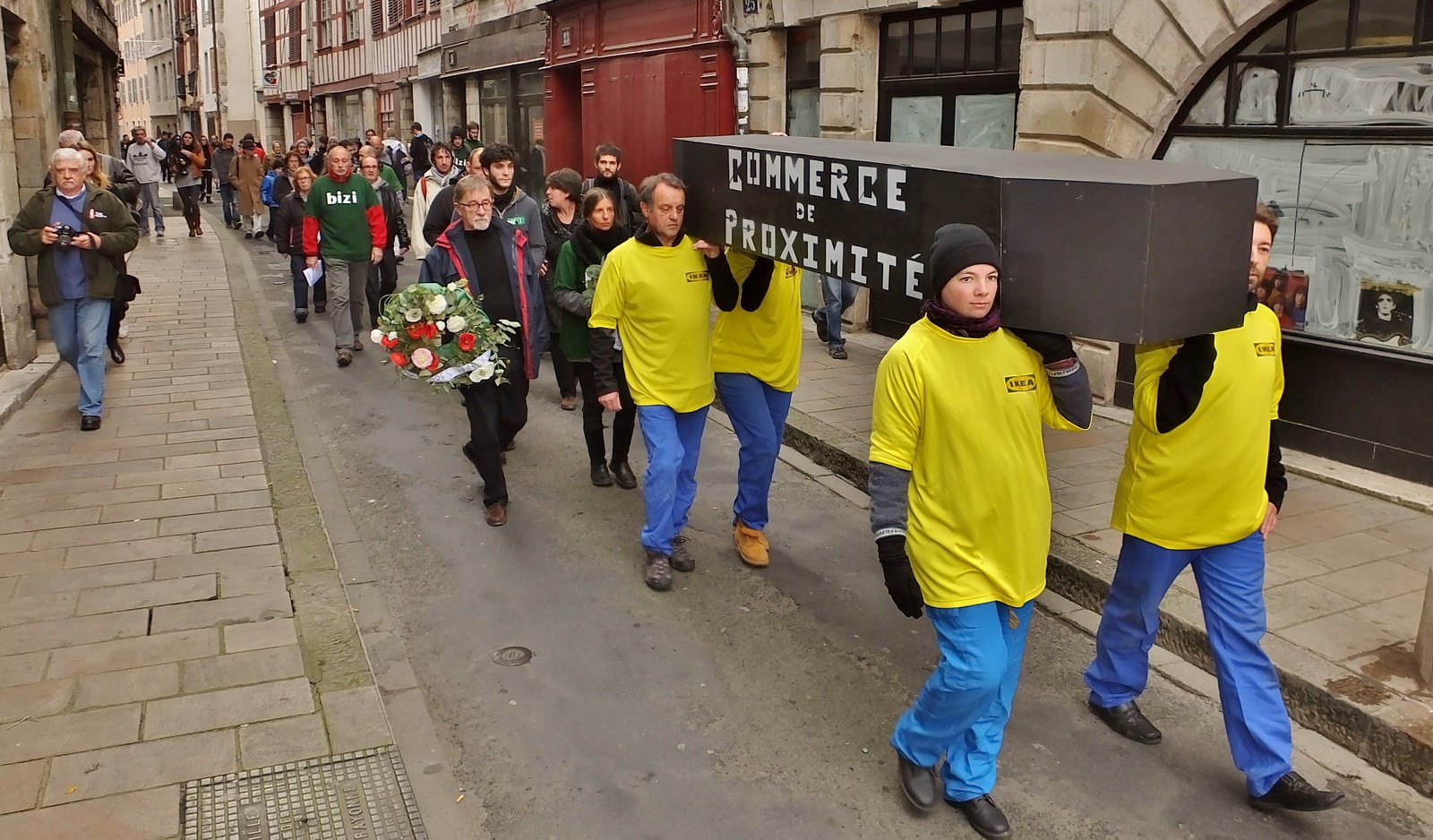
On 26 August, more than one will be well marked on the calendar, as in Baiona the doors of the whole world will be opened in terms of furniture and decoration. The director of the franchise, Christian Kaelen, has assured that in the first three days they will receive a pilgrimage of 40,000 visitors. The official name will be IKEA-Ametzondo and next to the furniture store will be completed by multinationals such as Carrefour, Mc Donald’s, Mango and Primark, with a total of 92 brands. In the municipalities of the capital, Mugerre and Baiona will occupy 37,747 square meters, and each year they are expected to reach 8 million people. IKEA originally intended to introduce the new franchise in Irun, but through pressure and aid from public institutions it was drawn to Baiona. The mayor of the capital, Alain Iriart, attributed the arrival of the Swedes to the act of laying the first stone of the point of sale in December 2013: “The colors of Ikea are blue and yellow, the same as the historic shield of the Capital: we were made to find ourselves.” However, “luck” has brought concerns related to the economy, working conditions and nature.
The IKEA-Ametzondo space will bring a pollution of 8 million cars – 60% Hegoalde –, Live! according to data disseminated by the altermunde movement. The presence of the A63 and A64 motorways just 30 metres from the point of sale will not help to improve the situation. The Cadre de Vie de Mugerre partnership is dedicated to the defence of the environment and has been one of the groups that has placed the ecological perspective at the centre of the debate. “It will be an attack on public health that provokes transportation around IKEA,” says Martin Bouchet, a member of the group. Colleagues at Cadre de Vi have also denounced that IKEA-Ametzondo has been built on a natural environment, with a stainless steel structure. “This is an easily flooded area and the waterproofing of the commercial area will affect the situation of the neighborhoods in the area at risk of flooding. The hormigonade of natural areas is a serious mistake,” according to Bouchet.
The Bayonne–Anglés-Biarritz triangle is packed with large shopping malls. The largest proportion of population and commerce in the French State is in cities such as Strasbourg or Rennes, with half a million inhabitants. The Baiona Chamber of Commerce and Industry, in a 2012 study, denounced this situation and asked public institutions to "stop a model that has no solution". Martín Bouchet has also been critical of the decision, “in the process of implementing IKEA citizenship has not been able to participate, it has been a decision made in the offices”.
The saturation of commercial areas has not only affected IKEA-Ametzondo, which is in the process of opening or expanding new commercial establishments. South of the Landes, in the town of Ondres as the new Shopping Les Allées or the expansion of the BAB2 shopping centre. Sales of large shopping malls in Baiona will contract 25%, according to a 2014 study by the Procos Federation for urbanism and specialized trade. Many international studies confirm this dark prediction. David Neumark, Junfu Zhang and Stephen Ciccarella are the university professors who say that every job generated in the multinationals destroys 1.64 jobs in small and medium-sized local trade.
The strongest argument used in favour of the arrival of multinationals is job creation. IKEA has promised 300 jobs, plus another 800 in Ametzondo, the expansion of BAB2 has announced 300 and Les Allées Shopping 1,500. The Ametzondo authorities say that 80% of the jobs will be for nearby people, but they associate that data with marketing to the members of the Cadre de Vie: “No economic analysis has been presented to ascertain the truthfulness of these figures. Of the 300 delegates commissioned by IKEA, at the moment only 155 contents have been offered in public. So who can believe that 800 jobs will be created in Ametzondo? members of the group are also pessimistic about unanswered questions: “What kind of jobs and, above all, what contracts and working conditions will they offer?”
The signs of the answer can be found 160 kilometres away.

Protests by social movements in Barakaldo are numerous to denounce the precarious working conditions that are taking place in MegaPark.
(Photo: Berriotxos)
Barakaldo's precarious mirror
In 2004 IKEA landed in Barakaldo in the context of the “happy times” prior to the economic crisis, specifically in the giant MegaPark. It's the fifth largest mall in Europe. 440,000 square meters, of which 127,000 correspond to shops, with an annual influx of 18 million visitors. In addition to Ikea, Leroy Merlin, ToyRus, Decathlon, El Corte Inglés and Media Markt are some of the most prominent brands on the output grid. As in the case of Baiona, large shopping centres have multiplied in the same area: MegaPark, MaxCenter, Max Ocio, shops like Carrefour… This border area of Barakaldo, Valle de Trapagan and Sestao has one of the largest ratios between shops and inhabitants of Europe.
IKEA was built on Barakaldo’s last natural wetland, which caused the anger of citizens and environmental groups. The neighborhood association of the neighborhoods of Zuatzu and Arteagabeitia, IKEA, bears the same name as the wetland: Ibarreta. Member of the association, Txiki Castaños, stressed that the decision was against the will of the people. “In 1990, a survey was conducted on land use around the Ibarreta-Zuloko wetland and the barakaldeses chose a public park by far. They didn't listen. Instead, they brought us the destruction, pollution and precariousness of the natural space.”
The hypocrisy of politicians seems to him to be deplorable, as all parties, despite their speech in favour of small trade, have promoted the arrival of the multinationals. “The multinational based economic model has had a great impact throughout the region, but the worst thing is that the arrival of the multinationals has not stopped.” Mercadona urges the City Hall to open its MegaPark store shortly. “The City Hall itself acknowledges that the area is saturated with commercial areas. As Saturn did in 2012, if IKEA ever came, they would once and for all bet on the small trader and not let other multinationals settle.”
The main argument for the implementation of IKEA in Baiona was the same as in Barakaldo: the creation of many jobs. Although it has never reached the initial 500 jobs promised, many people in IKEA have found it possible to sell their workforce. What work? “The only thing IKEA has offered has been precariousness.” The LAB representative, Gotzon Mardarats, has been convinced that the LAB union will do so. He has worked for eleven years at IKEA in Barakaldo since its foundation and, in his view, the situation has worsened year after year. “We do not have a collective agreement of our own, they impose on us at the state level, they have ordered dozens of unjustified layoffs, they have reduced the conditions of dismissal, as they have done with the savings of working days, and most seriously, they aim to divide the workers by increasing the differences between those who have a fixed post and a temporary contract. 30% of the workforce is temporary and depending on the type of contract, making the same number of hours and work, the salary can reach 4,000 euros. It’s social dumping, blackmail.”
Mardarats affirms that job insecurity at IKEA in Barakaldo has the face of a young woman, based on the latest official data (2012). Of the 424 workers, 130 earn less than the inter-professional minimum wage (14 pay out of 645.30 euros), of which 74% are women. Only 39% of workers receive salaries above EUR 900 per month.
The tightening of working conditions has not been related to the benefits of IKEA. “The misnamed crisis touched here more intensively in the 2010-2011 period. However, in 2011 IKEA won EUR 11,926,000. In other words, between 2008 and 2014, in 7 years of Barakaldo’s IKEA crisis it has earned a profit of 57 million euros and has never suffered losses in its entire trajectory.”
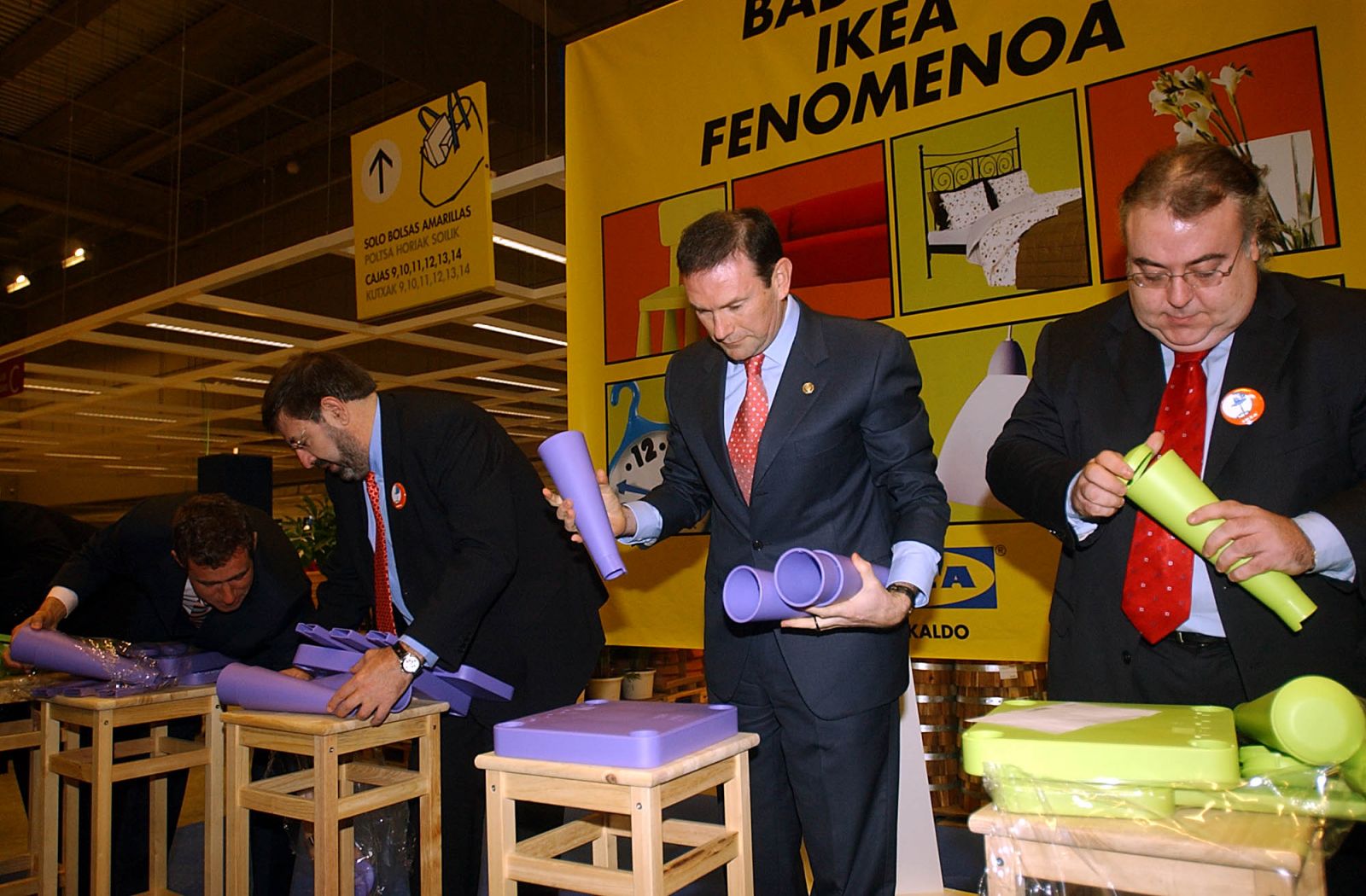
Right and left: The Mayor of Barakaldo, Tontxu Rodríguez, the lehendakari Juan José Ibarretxe, the delegate of the Spanish Government in the Basque Country, Paulino Luesma, and the Swedish ambassador, Lars Grundberg, riding chairs on the day of the inauguration of IKEA. (Photo: Monika del Valle)
Trapped in the vicious circle of precariousness
At 6 o'clock in the morning you get to work, sign the contract, start working, finish, throw the contract out in the trash and until the morning after the unemployment. With a new contract every day and for 900 euros a month, a young woman spent a year in the Decathlon district in Barakaldo. This is a real example given by Juan Carlos Becerra, member of the group against social exclusion Berriotxoak, asked about the type of work he does in MegaPark. But the question is, if we knew that that woman, like many of us, buys t-shirts in Zara, television in Media Markt, tomatoes in Mercadona, lockers in IKEA and sports shoes in Decathlon, who would surprise you? Although the work offered by the multinationals is related to precariousness and exploitation, do we stop shopping in these types of establishments? There is only one approach to a large mall on any weekend to know what the low cost model is embedded in our lives.
According to a study conducted by consultant Nielsen in 2014, the purchase price is the requirement that prioritizes 90% of the population, while 65% prefer promotions as a second variable. The quality of the product comes from behind and concerns such as the conditions of the workers of the company, respect for nature or the social use of the benefits do not even appear on the list. It seems that the “I am not stupid” model has us trapped, but is it possible to get out of the evil loop that offers us a low cost way of life through low cost products?
Need to create alternatives
According to the report José Ramón Becerra, engineer and environmental activist, for the publication in April of 10,000 climate jobs in Ipar Euskal Herria: “In the face of the global economic, social and political crisis, people are obliged to create local and regional strategies that promote social cohesion.” A similar logic is shared by many of the current movements that have addressed the challenge of creating alternatives to consumerism.
Long live! the cry of the members of the movement represents the shared line: “We do not want to live linked to the hyper-consumer model and the globalised funding of IKEA. The purchase or consumption stock of each of us is a vote.” At a time when factual powers see us as consumers and not as citizens, they stress the importance of giving political meaning to our everyday consumer choices. That is, many movements propose to address the personal responsibility that many times the left have neglected and change our life model, which is at the center of the problem. Without waiting for anyone or anything, disobeying the “bad” consumption habits of today, with the aim of living “well” from today.
Delving into the idea that “personnel is political” feminism has known – today we know that there are no magic formulas that replace the model of multinationals – suggest that capitalism will not resort to comfy and prefabricated responses before, and to the invitation to reflect on our daily consumption habits: Do I really need what I want to buy? If so, can I get it through recycling? If not, can I get it in local or nearby shops? What do I know about the process that the product has had to get to me? Following the motto “The question opens the way”, they prioritize the exercise of empowerment and responsibility, which is accompanied by the question rather than the answer.
By pulling away from this logic, proposals such as “social DIY” have been created. These are collective initiatives to promote the recycling and reuse of furniture and household electrical appliances that have been the victims of programmed obsolescence. “All right, that’s all very nice, but next week, where will I buy a closet for my room at a similar price?” the colerized friend will tell you, asking for a store with name and surname. And you get blackened, knowing that sharks that graze exploitation and precariousness at sea from the logic of money will always succeed. Precisely for this reason, one of the main challenges social movements face is to develop a pedagogy to make the leap from theory to practice, which often appears to be an abyss.
In Ipar Euskal Herria, to prevent the construction of IKEA and some of the large shopping centers in the area is too late, but for the members of Bizi! The finishing of small shops is not written, if we change our customs and prioritize local consumption. “Are we sure we want to see all of that disappearing? Let’s choose the world we want to live.” Whatever the response of the citizens, our world depends on the logic that guides our small daily elections, both in Barakaldo and in Baiona.

Multinazionalaren sortzaileak Ingvar izena du (I), Kamprad du abizena (K), Elmtaryd baserrikoa da (E), eta Agunnaryd-en hazi zen (A). Hortik jaio zen munduko altzari eta dekorazio enpresarik ezagunena: IKEA.
1940ko hamarkadan sortu zuen Ingvar Kampradek ia-ia ezerezetik abiatuta –pospoloak merke erosi eta auzokideei saltzen zizkien batengana eta bestearengana bizikletan joanez–. Gaur egun 35.000 milioi euro inguruko dirutzaren jabe egin da. Multinazionalaren etorkizuna bere hiru semeen esku dago egun.
Enpresa suediarrak 3.300 milioi euroko irabaziak izan zituen 2013an. Hazkundea dute jomuga: 2020 baino lehenago salmentak bikoiztu nahi dituzte –50.000 milioi euro–. Prezio merkeak eskaintzea da IKEAren karta nagusia, baina, nola lortzen dute? Kampradek hala esan zuen bere biografian: “Salneurri baxu hauek beti daude justifikatuta, eta horrek eskaera itzelak inposatzen dizkie gure kolaboratzaileei. Gure gastuak zorrotz mugatu ezean, inoiz ezingo dugu gure misioa bete”.
Kapitalismoaren arau guztiak jarraitu dituzten enpresa orotan bezala, “arrakastak” badu haren alde iluna. Ikus ditzagun horietako batzuk historian atzera luze jo gabe:
-1994tik 1998ra bitartean, Pakistan, India, Vietnam, Errumania eta Filipinetako IKEAren hornitzaileetako lan esplotazioak hedabideen arreta bereganatu zuen. Horren haritik, jendea ez esplotatzeko jokabide-kodea idatzi zuen multinazionalak, nahiz eta besteak beste, onartzen duen 12 urteko haurrek lan egitea, baldin eta euren herrialdeetan legezkoa bada.
-2007an Le Monde Diplomatique hilabetekariak argitaraturiko ikerketa batek India, Bulgaria eta Vietnameko fabriketako egoera salatu zuen: gutxienekoaren azpiko soldatak, 12 eta 15 ordu bitarteko lanaldiak asteko zazpi egunetan, haurren erabilera, mehatxuak eta sindikatuak antolatzeko trabak.
-2008an ZDF telebista kate publiko alemaniarrak argitara eman zuen langileak espiatzeko bideozaintza sistema ezarri zutela euren dendetan, enpresa-batzordeari jakinarazi gabe.
-Olivier Bailly, Jean-Marc Caudron eta Denis Lamberten IKEAk maite zaitu: desmuntatu beharreko eredua liburuak altzarietarako egurra Errusia eta Txinako basoetan kontrolik gabe lortzen dutela salatu zuen, besteak beste.
-2012an IKEAk barkamena eskatu zuen 1980ko hamarkadan altzariak muntatzeko Alemaniako Errepublika Demokratikoko (AED) eta Kubako preso politikoak erabili zituela jakin zenean.
-2011n Suediako telebistako kazetari Elisabeth Åsbrink-en liburu batek agerian utzi zuen Ingvar Kamprad Suediako Langileen Alderdi Nazionalsozialistako kide izan zela Bigarren Mundu Gerraren amaierara arte. Kampradek publikoki barkamenak eskatu zituen.
-2013an Terapia izeneko publizitate kanpainaren balio kontsumistak direla-eta, Ekologistak Martxan taldeak Premios Sombra sarietako finalista izendatu zuen IKEA.
-Aurten Network Social Responsability (NeSoVe) Gobernuz Kanpoko Erakundeak “IKEAren hipokrisia” salatu zuen. “Jendaurrean enpresa jasangarria dela dio, baina bere hornitzaileek langileen eskubideak urratzeaz gain, zergak ordaintzea saihesten saiatzen da”.
Marokok Ikeari dendak irekitzeko baimena ukatu eta Suediako produktuei betoa ezarri ostean, Suediako Gobernuak atzera bota du Saharako Errepublika Arabiar Demokratikoa estatu gisa aitortzen zuen ebazpena.
Enpresa suediarrak 336 kilometro karratuko basoa erosi du Errumaniako ipar mendebaldean, Wall Street Journalek jakitera eman duenez.
"Ikearen etorrerak Baionako saltokiei kolpe hilgarria emango die", salatu dute Bizi! mugimenduko kideek, Suediako multinazionalak Lapurdiko saltokiaren lehen harria jarriko duenean.
Atzo, asteartean, goizeko 9etan kafetegi batean entzundakoak ondo laburbildu du gaur Barakaldon grebak izan duen eragina. Zerbitzaria eta bezeroa, biak berrogei urteren bueltan, emakumezkoak, barran kateatuta hitz eta pitz. Zeinen gaizki dagoen kontua, politikari guztiak... [+]
Baiona, Mugerre eta Hiriburuko udalerriak ukitzen dituen 24.000 metro koadroko lur sailean eraikiko du Ikeak saltoki berria. Dagoeneko hiru herriotako auzapezek baimena eman dute saltokia irekitzeko, FR3-Euskal Herri telebista kateak atzo zabaldu zuenez. Proiektuak Baionako... [+]
Baiona, Capbreton eta Port d’Albret-eko jendeen artean, Aturri ibaiaz jabetzeko mendeetako borroka eraman zen. Jakina, baionarrek irabazi zuten, errekaren aho berria Bokalen finkatuz. Ondresko oinezkoen blog batean aurkitu genuen lehen aldiz ibilaldi harrigarri horren... [+]















